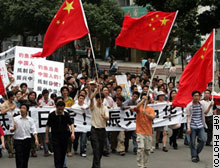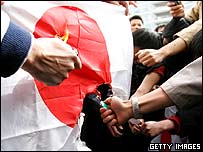
Nationalism, not Democracy, stirs protests in China.
Protests in mainland China are as common as the passing of Halley’s Comet. And, when they do occur, one can be sure that government officials have inspected every slogan and banner to ensure conformity with the Communist Party line.
The Tiananmen Square protest of 1989, of course, was a notable exception to this rule. And, the way the Party disciplined many of those Democratic adventurers (by death or interminable prison sentences) guaranteed that no sensible Chinese would ever show such initiative again.
At any rate, protest was in full bloom in China once again last week. The cause celebre this time was defending national pride against a provocative and imperious insult by China’s perennial nemesis, Japan.
And, what did the constitutionally passive Japanese do to provoke these protests? Well, it seems Japan decided to whitewash its historical embarrassments by approving textbooks which finessed wartime atrocities committed by Japanese soldiers against Chinese civilians (the most egregious example being their glossing over the notorious massacre and rape of Nanjing).
But before anyone accuses the Chinese of hypersensitivity in this regard, it might be helpful to recall the Afrocentric protests in the United States during the 1970s and 80s against textbooks which failed to adequately detail the abuses of whites against blacks throughout American history. Indeed, those protesters even demanded that more pages be dedicated to the contributions blacks made to the growth of the United States.
Therefore, these state sponsored protests in China are entirely warranted. And, especially since America was universally condemned for such deceit, it seems foolhardy for Japan to try to hide shameful periods of its history from future generations of Japanese. (After all, the aphorism holds: Those who are ignorant of their past are condemned to repeat it.)
Clearly Japan has no reason to fear that these protests will escalate beyond words and demonstrations in the streets of China. Indeed, even the Chinese would concede that they are gearing up their military forces to “discipline” their brothers in Taiwan, not to take on Japan.

Chinese officials permit burning of the Japanese flag as a harmless form of national protest.
Nevertheless, it is more important for Japan to redress this oversight than for the Chinese to be appeased. Indeed, if the Pope could go to the Wailing Wall and apologize for sins committed by Christians against Jews, and if President Clinton could go to Africa and apologize for the atrocities of American slavery, then surely President Koizumi should go to China and apologize for the wartime cruelties committed by the Japanese against innocent Chinese.
Moreover, such openness and willingness to reconcile differences with past enemies might actually help Japan in its bid to gain a permanent seat on the Security Council of the United Nations. There can be no doubt, however, that a slighted China could prove an insurmountable obstacle to its UN ambitions.
Yet, this spat seems as much about past Japanese aggression as about the future domination of Asia. And, China may be attempting to exact the first of many concessions from Japan in what it hopes will be a prolonged period during which it exercises decisive influence not only in Asia but also internationally and, indeed, even at the United Nations.
(It will certainly be interesting to see whether Japan (with its imperial past) or China (with its superpower potential) will be the first to earn that coveted seat on the Security Council of the UN.)
As for this row, ironically, it may be that even if the textbooks included accurate accounts of Japan’s sordid history, much of it would probably be lost on Japanese students who are reported to watch more television than anyone else in the entire world.
News and Politics
Leave a Reply
You must be logged in to post a comment.